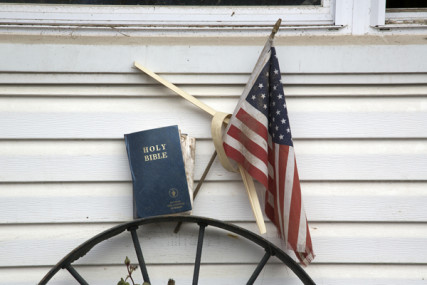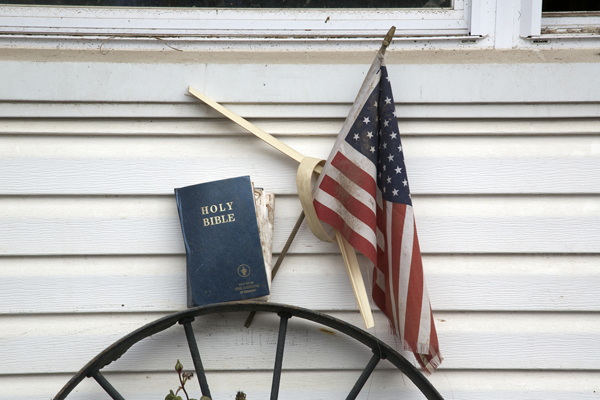
(RNS10-jan15) Flag and Bible in front of a home impacted on Staten Island, NY. RNS photo by Arthur McClanahan/Iowa Annual United Methodist Conference.
I have been listening to our potpourri of politicians pretending to be prepared for the presidency for any traces of foreign policy clarity — or religious/ethical values underlying their foreign policy proposals. There’s not much there so far.
One big-picture way to think about this issue is to draw a distinction between those who want America to act in foreign affairs exclusively to advance our national interests, and those who desire that the United States advance a certain set of values in the international arena, whether or not this advances our self-interest.
Take a nationalist account of our foreign policy goals as security, strong alliances, diplomatic success, and economic self-interest. There are no ideals at work in such a vision, just national self-interest. We want to be secure, well-connected, powerful, and wealthy. We want world events to work out in a way that benefits our interests. Let’s call this a Great America vision. Presidents use national power to keep/make America great.
Policies that go with such goals might include maintaining the strongest military in the world, aggressive use of drones, special forces and other means to go after terrorist enemies, a robust alliance system with substantial US troop presence in especially dangerous areas, aggressive diplomacy that brooks few compromises, and nationalist economic and trade policies.
Now contrast that with a moralistic view that says the goal of US foreign policy should be to advance American/humane values. Then let’s say those values are defined as freedom, democracy, human rights, global peacemaking, and advancing the global common good. This is America the selfless, or at least less selfish, America as emissary for good in the world, America the nation using its great power to make life better for other people. Let’s call this a Good America vision. Presidents use national power to advance values.
Policies reflecting this approach might include maintaining substantial budgets for foreign aid, regular use of US diplomacy and perhaps military force to advance freedom and democracy, humanitarian intervention in situations of human rights violations, and strong support for the United Nations and other global and regional bodies.
There’s a third option: isolationism, which would aim at limiting international engagement and focusing on issues within our borders. This would involve less military intervention around the world, and the abandonment of any kind of missionary or ethical vision for fixing the world’s worst problems using US power and dollars. Isolationism rejects both of the models just outlined. Let’s call this an America Alone vision.
A very interesting thing about these three US foreign policy options is that in a deeply polarized country they do not track along left/right or party lines. The Good America vision has had vocal advocates in both parties, though perhaps more strongly on the Democratic side. The Great America vision has likewise gained support across party lines, though perhaps is more characteristic of Republicans. And America Alone isolationism has been and can be found in both parties.
My observation is that religious zeal tends to push pious politicians toward the Good America option in some form or another. You can see it in Woodrow Wilson, Jimmy Carter, and George W. Bush. Adherents of a Christian faith that eschews selfishness and elevates regard for others, they took that morality into foreign affairs — for better or for worse. This was not the approach of, say, Richard Nixon, nor would it be the policy of a President Trump or President Webb.
It would be illuminating if at least one presidential debate required candidates to clarify whether theirs would be a Great America, Good America, or America Alone foreign policy. It would also be important to know what values would determine the answer to that question.





